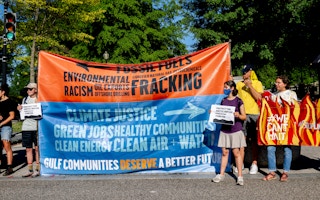Climate-related litigation has soared globally since 2015, with governments and private firms facing unprecedented challenges over their emissions, UK-based researchers said on Friday.
Almost 55 per cent of 1,841 cases brought to 13 courts in 40 countries between 1986 and May this year were filed since 2015, the year of the Paris Agreement to limit to limit global warming to 1.5 Celsius above pre-industrial levels, the study found.
“The number of ‘strategic’ cases is dramatically on the rise,” said the London School of Economics (LSE) report, referring to activist cases that aim to bring about a broad shift in policy.
“Litigation that is aligned with climate goals is on balance seeing success and there has been a run of important wins in the last 12 months.”
A Dutch court issued a landmark ruling in May, ordering Royal Dutch Shell to drastically deepen planned greenhouse gas emission cuts after environmental groups said the firm’s continued fossil fuel investments threatened human rights.
Shell vowed to appeal the ruling.
The United Nations has also predicted more court action amid growing worry about climate change, protracted wrangling over how to stop it and a mounting sense of urgency.
Most cases assessed by the LSE were brought against governments but new arguments involving high emitters in the private sector are likely to increase moving forward, LSE co-author Catherine Higham told the Thomson Reuters Foundation.
“There is more diversity in the arguments being used, incorporating, for example, themes of greenwashing and fiduciary duty. Businesses need to be aware of litigation risk,” the report said.
Of 369 decided cases, 58 per cent were favourable to climate change action, 32 per cent were unfavourable, and 10 per cent had neutral outcomes, the study found, with lawsuits brought in the United States, France, Pakistan and the East African Court of Human Rights.
Michael Hausfeld, who chairs Hausfeld, a law firm that is active on the issue, said he had seen a “crescendo” building in courts across the world.
“What we see is truly a change in the landscape — the addition and engagement of the law,” he said.
“The law has a responsibility in such a situation to enforce the principles that we believe are at stake,” he said, referring to climate goals outlined in the Paris Agreement and broader human rights issues.
This story was published with permission from Thomson Reuters Foundation, the charitable arm of Thomson Reuters, that covers humanitarian news, climate change, resilience, women’s rights, trafficking and property rights. Visit http://news.trust.org/climate.










